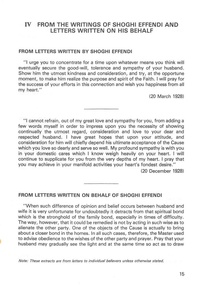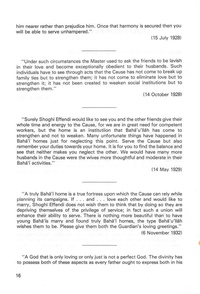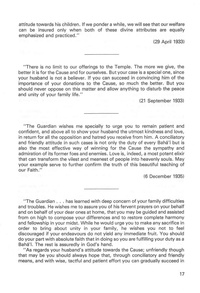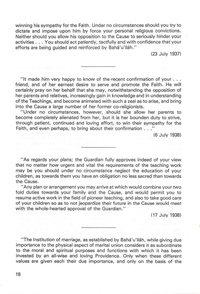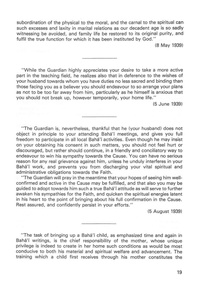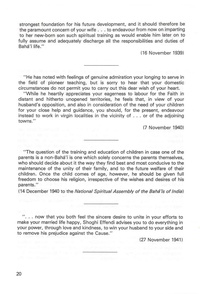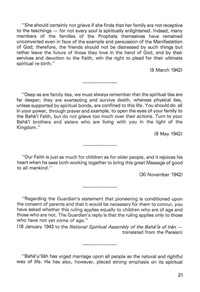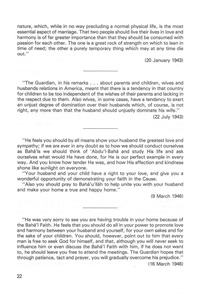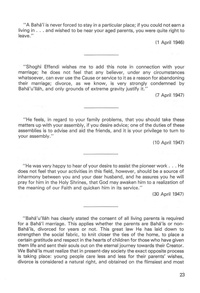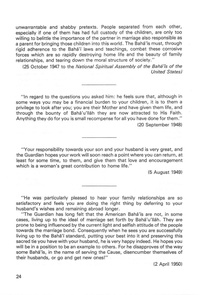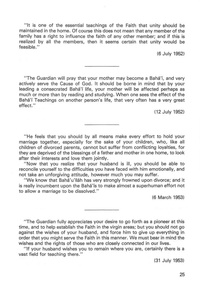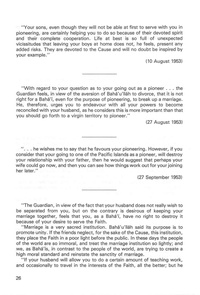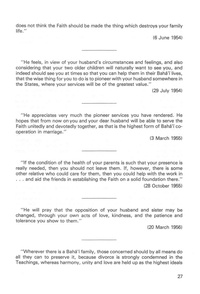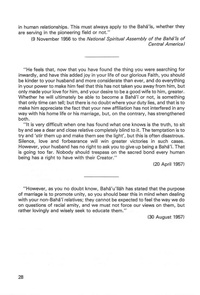Family Life/From the Writings of Shoghi Effendi and letters written on His Behalf
The text below this notice was generated by a computer, it still needs to be checked for errors and corrected. If you would like to help, view the original document by clicking the PDF scans along the right side of the page. Click the edit button at the top of this page (notepad and pencil icon) or press Alt+Shift+E to begin making changes. When you are done press "Save changes" at the bottom of the page. |
IV FROM THE WRITINGS OF SHOGHI EFFENDI AND LETTERS WRITTEN ON HIS BEHALF
FROM LETTERS WRITTEN BY SHOGHI EFFENDI
“| urge you to concentrate for a time upon whatever means you think will eventually secure the good-will, tolerance and sympathy of your husband. Show him the utmost kindness and consideration, and try, at the opportune moment, to make him realize the purpose and spirit of the Faith. | will pray for the success of your efforts in this connection and wish you happiness from all my heart.”
(20 March 1928)
“l cannot refrain, out of my great love and sympathy for you, from adding a few words myself in order to impress upon you the necessity of showing continually the utmost regard, consideration and love to your dear and respected husband. | have great hopes that upon your attitude, and consideration for him will chiefly depend his ultimate acceptance of the Cause which you love so dearly and serve so well. My profound sympathy is with you in your domestic cares which | know weigh heavily on your heart. | will continue to supplicate for you from the very depths of my heart. | pray that you may achieve in your manifold activities your heart's fondest desire.”
(20 December 1928)
FROM LETTERS WRITTEN ON BEHALF OF SHOGHI EFFENDI
“When such difference of opinion and belief occurs between husband and wife it is very unfortunate for undoubtedly it detracts from that spiritual bond which is the stronghold of the family bond, especially in times of difficulty. The way, however, that it could be remedied is not by acting in such wise as to alienate the other party. One of the objects of the Cause is actually to bring about a closer bond in the homes. In all such cases, therefore, the Master used to advise obedience to the wishes of the other party and prayer. Pray that your husband may gradually see the light and at the same time so act as to draw
Note: These extracts are from letters to individual believers unless otherwise stated.
15
him nearer rather than prejudice him. Once that harmony is secured then you will be able to serve unhampered.””
(15 July 1928)
“Under such circumstances the Master used to ask the friends to be lavish in their love and become exceptionally obedient to their husbands. Such individuals have to see through acts that the Cause has not come to break up family ties but to strengthen them; it has not come to eliminate love but to strengthen it; it has not been created to weaken social institutions but to strengthen them.”
(14 October 1928)
“Surely Shoghi Effendi would like to see you and the other friends give their whole time and energy to the Cause, for we are in great need for competent workers, but the home is an institutiion that Baha'u'llah has come to strengthen and not to weaken. Many unfortunate things have happened in Baha’i homes just for neglecting this point. Serve the Cause but also remember your duties towards your home. It is for you to find the balance and see that neither makes you neglect the other. We would have many more husbands in the Cause were the wives more thoughtful and moderate in their Baha’i activities.”’
(14 May 1929)
“A truly Baha’i home is a true fortress upon which the Cause can rely while planning its campaigns. If ... and... love each other and would like to marry, Shoghi Effendi does not wish them to think that by doing so they are depriving themselves of the privilege of service; in fact such a union will enhance their ability to serve. There is nothing more beautiful than to have young Baha’is marry and found truly Baha’i homes, the type Baha’u’llah wishes them to be. Please give them both the Guardian’s loving greetings.”
(6 November 1932)
“A God that is only loving or only just is not a perfect God. The divinity has to possess both of these aspects as every father ought to express both in his
16
attitude towards his children. If we ponder a while, we will see that our welfare can be insured only when both of these divine attributes are equally emphasized and practiced.”
(29 April 1933)
“There is no limit to our offerings to the Temple. The more we give, the better it is for the Cause and for ourselves. But your case is a special one, since your husband is not a believer. If you can succeed in convincing him of the importance of your donations to the Cause, so much the better. But you should never oppose on this matter and allow anything to disturb the peace and unity of your family life.””
(21 September 1933)
“The Guardian wishes me specially to urge you to remain patient and confident, and above all to show your husband the utmost kindness and love, in return for all the opposition and hatred you receive from him. A conciliatory and friendly attitude in such cases is not only the duty of every Baha’i but is also the most effective way of winning for the Cause the sympathy and admiration of its former foes and enemies. Love is, indeed, a most potent elixir that can transform the vilest and meanest of people into heavenly souls. May your example serve to further confirm the truth of this beautiful teaching of our Faith.”
(6 December 1935)
“The Guardian. . . has learned with deep concern of.your family difficulties and troubles. He wishes me to assure you of his fervent prayers on your behalf and on behalf of your dear ones at home, that you may be guided and assisted from on high to compose your differences and to restore complete harmony and fellowship in your midst. While he would urge you to make any sacrifice in order to bring about unity in your family, he wishes you not to feel discouraged if your endeavours do not yield any immediate fruit. You should do your part with absolute faith that in doing so you are fulfilling your duty as a Baha’i. The rest is assuredly in God’s hand.
“As regards your husband's attitude towards the Cause; unfriendly though that may be you should always hope that, through conciliatory and friendly means, and with wise, tactful and patient effort you can gradually succeed in
17
winning his sympathy for the Faith. Under no circumstances should you try to dictate and impose upon him by force your personal religious convictions. Neither should you allow his opposition to the Cause to seriously hinder your activities . . . You should act patiently; tactfully and with confidence that your efforts are being guided and reinforced by Baha’u’llah.”’
(23 July 1937)
“It made him very happy to know of the-recent confirmation of your. . . friend, and of her earnest desire to serve and promote the Faith. He will certainly pray on her behalf that she may, notwithstanding the opposition of her parents and relatives, increasingly gain in knowledge and in understanding of the Teachings, and become animated with such a zeal as to arise, and bring into the Cause a large number of her former co-religionists.
“Under no circumstances, however, should she allow her parents to become completely alienated from her, but it is her bounden duty to strive, through patient, continued and loving effort, to win their sympathy for the Faith, and even perhaps, to bring about their confirmation . . .”
(6 July 1938)
“As regards your plans; the Guardian fully approves indeed of your view that no matter how urgent and vital the requirements of the teaching work may be you should under no circumstance neglect the education of your children, as towards them you have an obligation no less sacred than towards the Cause.
“Any plan or arrangement you may arrive at which would combine your two fold duties towards your family and the Cause, and would permit you to resume active work in the field of pioneer teaching, and also to take good care of your children so as to not jeopardize their future in the Cause would meet with the whole-hearted approval of the Guardian.”
(17 July 1938)
“The Institution of marriage, as established by Baha’u’llah, while giving due importance to the physical aspect of marital union considers it as subordinate to the moral and spiritual purposes and functions with which it has been invested by an all-wise and loving Providence. Only when these different values are given each their due importance, and only on the basis of the
18
subordination of the physical to the moral, and the carnal to the spiritual can such excesses and laxity in marital relations as our decadent age is so sadly witnessing be avoided, and family life be restored to its original purity, and fulfil the true function for which it has been instituted by God.”
(8 May 1939)
“While the Guardian highly appreciates your desire to take a more active part in the teaching field, he realizes also that in deference to the wishes of your husband towards whom you have duties no less sacred and binding than those facing you as a believer you should endeavour to so arrange your plans as not to be too far away from him, particularly as he himself is anxious that you should not break up, however temporarily, your home life.”’
(5 June 1939)
“The Guardian is, nevertheless, thankful that he (your husband) does not object in principle to your attending Baha’i meetings, and gives you full freedom to participate in all local Baha'i activities. Even though he may insist on your obtaining his consent in such matters, you should not feel hurt or discouraged, but rather should continue, in a friendly and conciliatory way to endeavour to win his sympathy towards the Cause. You can have no serious reason for any real grievance against him, unless he unduly interferes in your Baha’i work, and prevents you from discharging your vital spiritual and administrative obligations towards the Faith.
“The Guardian will pray in the meantime that your hopes of seeing him well- confirmed and active in the Cause may be fulfilled, and that also you may be guided to adopt towards him such a true Baha’i attitude as will serve to further awaken his sympathies for the Faith, and quicken the spiritual energies latent in his heart to the point of bringing about his full confirmation in the Cause. Rest assured, and confidently persist in your efforts.”’
(5 August 1939)
“The task of bringing up a Baha’i child, as emphasized time and again in Baha’i writings, is the chief responsibility of the mother, whose unique privilege is indeed to create in her home such conditions as would be most conducive to both his material and spiritual welfare and advancement. The training which a child first receives through his mother constitutes the
19
strongest foundation for his future development, and it should therefore be the paramount concern of your wife . . . to endeavour from now on imparting to her new-born son such spiritual training as would enable him later on to fully assume and adequately discharge all the responsibilities and duties of Baha’i life.”
(16 November 1939)
“He has noted with feelings of genuine admiration your longing to serve in the field of pioneer teaching, but is sorry to hear that your domestic circumstances do not permit you to carry out this dear wish of your heart.
“While he heartily appreciates your eagerness to labour for the Faith in distant and hitherto unopened territories, he feels that, in view of your husband's opposition, and also in consideration of the need of your children for your close help and guidance, you should, for the present, endeavour instead to work in virgin localities in the vicinity of . . . or of the adjoining towns.”
(7 November 1940)
“The question of the training and education of children in case one of the parents is a non-Baha’i is one which solely concerns the parents themselves, who should decide about it the way they find best and most conducive to the maintenance of the unity of their family, and to the future welfare of their children. Once the child comes of age, however, he should be given full freedom to choose his religion, irrespective of the wishes and desires of his parents.”
(14 December 1940 to the National Spiritual Assembly of the Baha'is of India)
‘".. . now that you both feel the sincere desire to unite in your efforts to make your married life happy, Shoghi Effendi advises you to do everything in your power, through love and kindness, to win your husband to your side and to remove his prejudice against the Cause.”
(27 November 1941)
20
“‘She should certainly not grieve if she finds that her family are not receptive to the teachings — for not every soul is spiritually enlightened. Indeed, many members of the families of the Prophets themselves have remained unconverted even in face of the example and persuasion of the Manifestation of God; therefore, the friends should not be distressed by such things but rather leave the future of those they love in the hand of God, and by their services and devotion to the Faith, win the right to plead for their ultimate spiritual re-birth.”’
(9 March 1942)
“Deep as are family ties, we must always remember that the spiritual ties are far deeper; they are everlasting and survive death, whereas physical ties, unless supported by spiritual bonds, are confined to this life. You should do all in your power, through prayer and example, to open the eyes of your family to the Baha’i Faith, but do not grieve too much over their actions. Turn to your Baha'i brothers and sisters who are living with you in the light of the Kingdom.”
(8 May 1942)
“Our Faith is just as much for children as for older people, and it rejoices his heart when he sees both working together to bring this great Message of good to all mankind.”
(30 November 1942)
“Regarding the Guardian’s statement that pioneering is conditioned upon the consent of parents and that it would be necessary for them to concur, you have asked whether this ruling applies equally to children who are of age and those who are not. The Guardian’s reply is that the ruling applies only to those who have not yet come of age.”
(18 January 1943 to the National Spiritual Assembly of the Baha‘is of Iran — translated from the Persian)
“Baha'u'llah has urged marriage upon all people as the natural and rightful way of life. He has also, however, placed strong emphasis on its spiritual
21
nature, which, while in no way precluding a normal physical life, is the most essential aspect of marriage. That two people should live their lives in love and harmony is of far greater importance than that they should be consumed with passion for each other. The one is a great rock of strength on which to lean in time of need; the other a purely temporary thing which may at any time die out.”
(20 January 1943)
“The Guardian, in his remarks . . . about parents and children, wives and husbands relations in America, meant that there is a tendency in that country for children to be too independent of the wishes of their parents and lacking in the respect due to them. Also wives, in some cases, have a tendency to exert an unjust degree of domination over their husbands which, of course, is not right, any more than that the husband should unjustly dominate his wife.”
(22 July 1943)
“He feels you should by all means show your husband the greatest love and sympathy; if we are ever in any doubt as to how we should conduct ourselves as Baha’is we should think of ‘Abdu’l-Baha and study His life and ask ourselves what would He have done, for He is our perfect example in every way. And you know how tender He was, and how His affection and kindness shone like sunlight on everyone.
“Your husband and your child have a right to your love, and give you a wonderful opportunity of demonstrating your faith in the Cause.
“‘Also you should pray to Baha’u’llah to help unite you with your husband and make your home a true and happy home.”
(9 March 1946)
“‘He was very sorry to see you are having trouble in your home because of the Baha’i Faith. He feels that you should do all in your power to promote love and harmony between your husband and yourself, for your own sakes and for the sake of your children. You should, however, point out to him that every man is free to seek God for himself, and that, although you will never seek to influence him or even discuss the Baha’i Faith with him, if he does not want to, he should leave you free to attend the meetings. The Guardian hopes that through patience, tact and prayer, you will gradually overcome his prejudice.”
(16 March 1946)
22
“‘A Baha’i is never forced to stay in a particular place; if you could not earn a living in. . . and wished to be near your aged parents, you were quite right to leave.”
(1 April 1946)
“Shoghi Effendi wishes me to add this note in connection with your marriage; he does not feel that any believer, under any circumstances whatsoever, can ever use the Cause or service to it as a reason for abandoning their marriage; divorce, as we know, is very strongly condemned by Baha’u'llah, and only grounds of extreme gravity justify it.”
(7 April 1947)
“He feels, in regard to your family problems, that you should take these matters up with your assembly, if you desire advice; one of the duties of these assemblies is to advise and aid the friends, and it is your privilege to turn to your assembly.”
(10 April 1947)
“He was very happy to hear of your desire to assist the pioneer work . . . He does not feel that your activities in this field, however, should be a source of inharmony between you and your dear husband, and he assures you he will pray for him in the Holy Shrines, that God may awaken him to a realization of the meaning of our Faith and quicken him in its service.”
(30 April 1947)
“Baha'u'llah has clearly stated the consent of all living parents is required for a Baha'i marriage. This applies whether the parents are Baha’is or non- Baha’is, divorced for years or not. This great law He has laid down to strengthen the social fabric, to knit closer the ties of the home, to place a certain gratitude and respect in the hearts of children for those who have given them life and sent their souls out on the eternal journey towards their Creator. We Baha’is must realize that in present-day society the exact opposite process is taking place: young people care less and less for their parents’ wishes, divorce is considered a natural right, and obtained on the flimsiest and most
23
unwarrantable and shabby pretexts. People separated from each other, especially if one of them has had full custody of the children, are only too willing to belittle the importance of the partner in marriage also responsible as a parent for bringing those children into this world. The Baha’is must, through rigid adherence to the Baha’i laws and teachings, combat these corrosive forces which are so rapidly destroying home life and the beauty of family relationships, and tearing down the moral structure of society.”
(25 October 1947 to the National Spiritual Assembly of the Baha'is of the United States)
“In regard to the questions you asked him: he feels sure that, although in some ways you may be a financial burden to your children, it is to them a privilege to look after you; you are their Mother and have given them life, and through the bounty of Baha'u'llah they are now attracted to His Faith. Anything they do for you is small recompense for all you have done for them.”
(20 September 1948)
“Your responsibility towards your son and your husband is very great, and the Guardian hopes your work will soon reach a point where you can return, at least for some time, to them, and give them that love and encouragement which is a woman’s great contribution to home life.”
(5 August 1949)
“He was particularly pleased to hear your family relationships are so satisfactory and feels you are doing the right thing by deferring to your husband's wishes and remaining abroad longer.
“The Guardian has long felt that the American Baha’is are not, in some cases, living up to the ideal of marriage set forth by Baha'u'llah. They are prone to being influenced by the current light and selfish attitude of the people towards the marriage bond. Consequently when he sees you are successfully living up to the Baha’i standard, putting your best into it and preserving this sacred tie you have with your husband, he is very happy indeed. He hopes you will be in a position to be an example to others. For he disapproves of the way some Baha'is, in the name of serving the Cause, disencumber themselves of their husbands, or go and get new ones!”
(2 April 1950)
24
“It is one of the essential teachings of the Faith that unity should be maintained in the home. Of course this does not mean that any member of the family has a right to influence the faith of any other member; and if this is realized by all the members, then it seems certain that unity would be feasible.”’
(6 July 1952)
“The Guardian will pray that your mother may become a Baha’i, and very actively serve the Cause of God. It should be borne in mind that by your leading a consecrated Baha'i life, your mother will be affected perhaps as much or more than by reading and studying. When one sees the effect of the Baha’i Teachings on another person’s life, that very often has a very great effect.”
(12 July 1952)
“He feels that you should by all means make every effort to hold your marriage together, especially for the sake of your children, who, like all children of divorced parents, cannot but suffer from conflicting loyalties, for they are deprived of the blessings of a father and mother in one home, to look after their interests and love them jointly.
“Now that you realize that your husband is ill, you should be able to reconcile yourself to the difficulties you have faced with him emotionally, and not take an unforgiving attitude, however much you may suffer.
“We know that Baha’u’ll4h has very strongly frowned upon divorce; and it is really incumbent upon the Baha’is to make almost a superhuman effort not to allow a marriage to be dissolved.”
(6 March 1953)
“The Guardian fully appreciates your desire to go forth as a pioneer at this time, and to help establish the Faith in the virgin areas; but you should not go against the wishes of your husband, and force him to give up everything in order that you might serve the Faith in this manner. We must bear in mind the wishes and the rights of those who are closely connected in our lives.
“lf your husband wishes you to remain where you are, certainly there is a vast field for teaching there.”
(31 July 1953)
25
“Your sons, even though they will not be able at first to serve with you in pioneering, are certainly helping you to do so because of their devoted spirit and their complete cooperation. Life at best is so full of unexpected vicissitudes that leaving your boys at home does not, he feels, present any added risks. They are devoted to the Cause and will no doubt be inspired by your example.””
(10 August 1953)
“With regard to your question as to your going out as a pioneer . . . the Guardian feels, in view of the aversion of Baha’u’llah to divorce, that it is not right for a Baha’i, even for the purpose of pioneering, to break up a marriage. He, therefore, urges you to endeavour with all your powers to become reconciled with your husband, as he considers this is more important than that you should go forth to a virgin territory to pioneer.”’
(27 August 1953)
“"., . he wishes me to say that he favours your pioneering. However, if you consider that your going to one of the Pacific Islands as a pioneer, will destroy your relationship with your father, then he would suggest that perhaps your wife could go now, and then you can see how things work out for your joining her later.”’
(27 September 1953)
“The Guardian, in view of the fact that your husband does not really wish to be separated from you, but on the contrary is desirous of keeping your marriage together, feels that you, as a Baha’i, have no right to destroy it because of your desire to serve the Faith.
“Marriage is a very sacred institution. Baha‘’u'llah said its purpose is to promote unity. If the friends neglect, for the sake of the Cause, this institution, they place the Faith in a poor light before the public. In these days the people of the world are so immoral, and treat the marriage institution so lightly; and we, as Baha’is, in contrast to the people of the world, are trying to create a high moral standard and reinstate the sanctity of marriage.
“If your husband will allow you to do a certain amount of teaching work, and occasionally to travel in the interests of the Faith, all the better; but he
26
does not think the Faith should be made the thing which destroys your family life.’
(6 June 1954)
“He feels, in view of your husband's circumstances and feelings, and also considering that your two older children will naturally want to see you, and indeed should see you at times so that you can help them in their Baha’i lives, that the wise thing for you to do is to pioneer with your husband somewhere in the States, where your services will be of the greatest value.”
(29 July 1954)
“He appreciates very much the pioneer services you have rendered. He hopes that from now onyou and your dear husband will be able to serve the Faith unitedly and devotedly together, as that is the highest form of Baha’i co- operation in marriage.”
(3 March 1955)
“lf the condition of the health of your parents is such that your presence is really needed, then you should not leave them. If, however, there is some other relative who could care for them, then you could help with the work in
. . and aid the friends in establishing the Faith on a solid foundation there.”
(28 October 1955)
“He will pray that the opposition of your husband and sister may be changed, through your own acts of love, kindness, and the patience and tolerance you show to them.”
(20 March 1956)
“Wherever there is a Baha’i family, those concerned should by all means do all they can to preserve it, because divorce is strongly condemned in the Teachings, whereas harmony, unity and love are held up as the highest ideals
27
in human relationships. This must always apply to the Baha’is, whether they are serving in the pioneering field or not.”
(9 November 1956 to the National Spiritual Assembly of the Baha‘ls of Central America)
“He feels that, now that you have found the thing you were searching for inwardly, and have this added joy in your life of our glorious Faith, you should be kinder to your husband and more considerate than ever, and do everything in your power to make him feel that this has not taken you away from him, but only made your love for him, and your desire to be a good wife to him, greater. Whether he will ultimately be able to become a Baha’i or not, is something that only time can tell; but there is no doubt where your duty lies, and that is to make him appreciate the fact that your new affiliation has not interfered in any way with his home life or his marriage, but, on the contrary, has strengthened both.
“It is very difficult when one has found what one knows is the truth, to sit by and see a dear and close relative completely blind to it. The temptation is to try and ‘stir them up and make them see the light’, but this is often disastrous. Silence, love and forbearance will win greater victories in such cases. However, your husband has no right to ask you to give up being a Baha’i. That is going too far. Nobody should trespass on the sacred bond every human being has a right to have with their Creator.”’
(20 April 1957)
“However, as you no doubt know, Baha'u'llah has stated that the purpose of marriage is to promote unity, so you should bear this in mind when dealing with your non-Baha’i relatives; they cannot be expected to feel the way we do on questions of racial amity, and we must not force our views on them, but rather lovingly and wisely seek to educate them.”
(30 August 1957)
28
